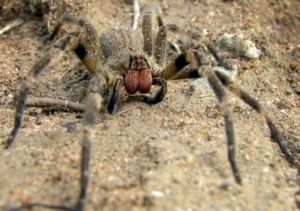News
World’s most dangerous spider falls out of banana in Denmark
This article is more than 8 years old.
Teenage girl gets an unwanted visitor during a snack

A banana with something extra (photo: Techuser)
It is believed that a Brazilian Wandering Spider – one of the world’s most deadly species – was recently discovered in Denmark after surviving the trip from the tropics hidden in a bunch of bananas.
A 16-year-old girl from Seest near Kolding ‘awakened’ the stowaway last week whilst eating a banana in her room.
“A cocoon fell into her hand while she was eating a banana,” the girl’s father Finn Nielsen told jv.dk.
“She threw it onto the floor, and when it opened up she saw that it was a spider. She just grabbed another banana and we thought no more about it.”
Still at large
Two days later, the girl spotted a big spider under the radiator. Her dad tried to capture it.
“The body was a little bigger than a large coin,” he said. “I tried to grab it with the vacuum cleaner, but it slipped away.”
The family was shocked when they searched the web and discovered that the unwelcome guest may be a Brazilian Wandering Spider, a species also known as the Banana Spider. The spider – which comes from Brazil, Argentina and Uruguay – is responsible for the most spider-related deaths worldwide.
An uncommon visitor
The family immediately contacted Netto, which apologised and asked Nielsen to contact a pest control firm.
“They have been here twice and put poison and sticky tape around,” said Nielsen. “We have ransacked the whole room, and it has been closed off. The pest control people will be back again.”
Only the family has seen the insect, so it has not been confirmed that it is indeed a banana spider. Netto owner Dansk Supermarked said that spiders are rarely seen in its shops.
“Bananas are indeed a part of nature, so it can happen that live animals may be found,” said Kasper Reggelsen from Dansk Supermarked.
“In 99.9 percent of cases, the animals have died long before the product hits the shelves. The bananas are gassed before they even cross the Atlantic, so there is not much chance of anything surviving.”
Reggelsen said that Dansk Supermarked takes customers seriously when they report a spider and offers to help in any way it can.










































